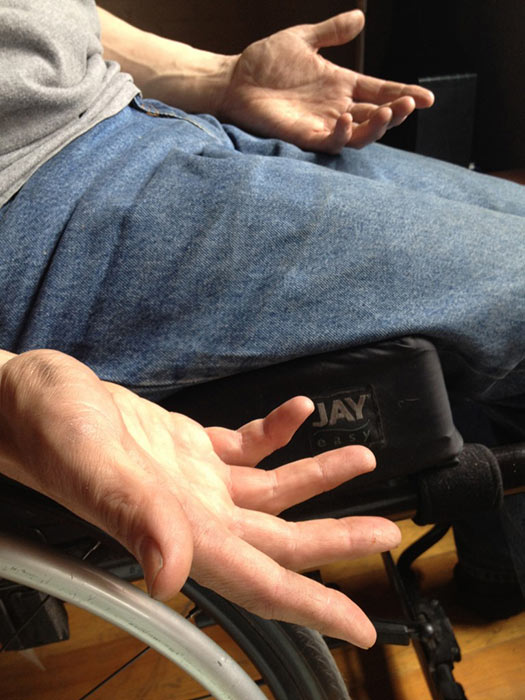I want to be honest about my more troubling emotions; about my reactions to difficult situations that aren’t easy to resolve.

Shifting a system seems to proceed at a glacial pace. “Don’t worry, we’re working on it.” That’s the external message. “Don’t worry, I’m working on it.” That’s my internal mantra. But where are the breakthroughs? How can I bring about a breakthrough?
With story after story of barrier after barrier, from blatant ignorance to needed curb cuts, it was painful to see how my peer group was being treated . “I’m not going to go away.” That’s what I muttered to move away from my bleak mood. “If nothing else, I’ll stay stubbornly present.”
As someone who is not part of the dominant power structure, self hatred is a common part of my existence. It is learned behavior. It is culturally constructed. It is a tool of discrimination. Vibrancy, youth, and athleticism are all good. But ability, like all those other goods, is malleable, and we are all on a continuum. Why is that so hard to accept? Why am I so hard to accept?
I know that I do not reflect those glossy images of success. Being self-propelled, I have a hard time keeping my hands clean. They are definitely worse for wear. Juggling food is a challenge, too, so I often wear at least a bit of my meals. I get jarred by potholes and cracks and uneven sidewalks. At the end of every day, I don’t feel so clean and shiny. Instead, I am bruised and battered and dirty.
Marked as I am, how do I make my mark? I’m conflicted. I believe in collective action. I know that change can come through extended conversation and group process. I have the strength and will to participate in campaigns that try to shift perceptions. But I’m more content when I tackle access issues as an individual. I try to make headway through personal relationships. When I was a counselor, I worked one-on-one, so I think I’m more effective in those settings. Is that why I find it hard to function as a member of a coalition? Or is it that I can’t bear to see my own vulnerability reflected in others? Nothing to see here, that’s what I exude. But there is so much to see: loss, fortitude, sorrow, faith.
If only I had a better mirror.

Courage is a beacon. Yours burns brightly! It will be difficult to be appraised of the constant goodness you contribute. Just be assured that it is being perceived and is a very positive force. Fight on my friend!
I hesitated to write a blog that had more questions than answers and more problems than solutions. Your unwavering support, Rick, shows me that we learn by light and by shadow.
It pains me to read of your self-hatred, to think about the truth of your statement that change happens brutally slowly, and the daily struggles. You’ve made your mark already.
Thank you, Randy. As I age, I have the same feelings: I don’t know how to fix myself, and I have a circus mirror that distorts my image. Or does it? Writing, for me, becomes a reality check.Your writing is inspiring, you latter-day Ring Lardner. I have located two Ring Lardner books in a used book store. I’ll save them for you.
If you’re looking into a circus mirror, Sterling, I hope that means you’ve been visiting the Fun House! Like you, I’m seeking clarity and confirmation of common experience. Writing seems to be one of the best ways to check and connect.
Another excellent and thought provoking blog, Ran!
What you have been doing in the field of disability is awesome, so don’t lose your faith.
With regards,
Kundan
I second Elizabeth’s comment. And will add to that: honest. Loved it. Thank you.
Randy,
I love that you have your blog to express a broad range of emotions and I applaud the courage and conviction to share them with us.
It’s funny, I’ve recently gone through a similar sense of frustration around the desire to implement change despite the barriers and apathy that can surround the cause.
Ultimately, for me, it boils down to creating momentum. To defeat the inertia that holds progress back. Momentum, measured in inches or miles, represents an advancement of the cause. And rather than be frustrated by the inefficiency of forward movement, I try to reflect on progress and build on it. Affecting one person. One business owner. One seeking a mentor. All these ones add up. And, most importantly, they become your advocates, your mouthpiece, your proxy in carrying the flag.
In reflecting upon your blog, I know that you’re affecting all of us very positively. We’re all card carrying members of the Randy Earle fan club. And in reading about your advocacy, we learn about the people you touch in and around you in Seattle and know that you’re making a difference.
It’s our responsibility to you to maintain your momentum and to help accelerate it.
I am humbled and heartened by your reply, Nick. One day I hope to take the best of this blog, both what I write and how others respond, and create a book that shows how authentic interaction can shape, change, and maintain the writer and the reader. Today was another tough one, so I needed a little wind in my sails to push me forward.